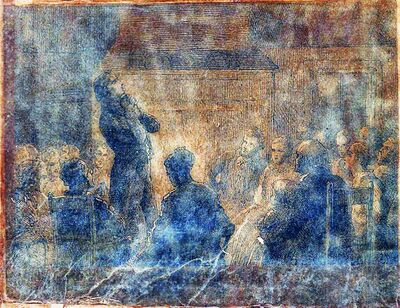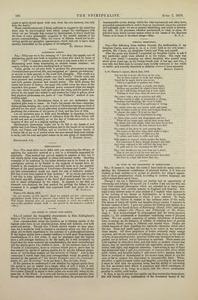< Soul and Spirit (continued from page 1-136) >
enjoying spirit to us after her death.
Recurring to elementary spirits how beautifull it will be if it turn out that they are waiting for incarnation to turn themselves (Undine-like) into immortal beings! How completely in accordance with all principles of perpetual upward development.
“So that the notion, so old yet so new to most, is not confined to those whose names are most associated with it in America. The notion that these elementaries are waiting for incarnation is that which is affirmed by the Occultists. Substantially they say that spirit passes through various stages of progression until it arrives at the condition of ‘rudimental man,’ endowed with all the mental but with none of the moral qualities of humanity. It has no soul, and so no conscience. That comes at incarnation by the inbreathing of the Divine Breath, and not till then is the heritage of immortality given. The elementaries have imperfect wills, and can be easily guided by an immortal man, i.e., by one born on this or other inhabited earths, and so endued with superior faculties. They assert, further, that they do interfere very materially in the affairs of our world, and are the authors of many of the lower phenomena of Spiritualism. Every careful observer must have noticed in circles constituted without any due regard to conditions, a class of manifestations which may be described as Puck-like freaks, or the gambols of an unembodied entity, destitute of moral consciousness, mischievous rather than distinctly evil. Such can hardly be referred to the action of undeveloped human spirits, for the tricks are not such as a man, how-ever uneducated or foolish, would be likely to do. They leave on the mind a distinct sense of being referable to a source not human. These, say the Occultists, are the pranks of the elementaries. They will plague those who allow themselves to be plagued; but they are the servants, obedient helpers of those who know their power, and will command them. And through it all, they themselves are progressing onwards to that phase of incarnation when they shall become ‘living souls.’
“Is it so? If it be, much light is thrown on vexed questions. If it be, man needs to know it, not to shirk it, and as Mrs. Britten says—scream ‘We know enough. We will stop our ears for fear we should hear too much.’ If it be, then the grand theory of evolution applies to all created things; and God is consistent with Himself in all spheres of His action. Man, by virtue of his immortality, is the lord of these inferior spirits, and when he knows his power, is in possession of the key to the secrets of nature which the Ancients had, and which we have lost.
“If it be only a dream, well; it will pass away, and we shall none of us be any worse for having swept away some of the cobwebs which from earliest days till now have hung about the subject of the intercourse between earth and that which has been thought to lie beyond it. For myself, I only say that the dream has one merit that dreams generally lack; it is very vraisemblable and coherent.”
Dr. Wyld on the Philosophy of Spiritualism
Sir, —It seems to me that the views I have held for many years regarding the dynamical constitution of physical bodies, if it does not explain, at least enables us to accept as possible, the alleged appearance of those presentations which, according to modern language, are called materialized spirit forms.
Though I am not a Spiritualist, not having had an opportunity of witnessing and judging for myself, yet I confess I am not one who can treat with contempt phenomena which are attested by so many seemingly competent and credible persons in England and America. Perhaps it may interest some of your readers if I explain what appears to be the bearing of my theory on Spiritualism, or at least as regards these abnormal manifestations to which I have referred. To begin then, I do not believe in matter in the ordinary sense of the word. The atoms of which all visible and tangible things consist, I conceive to be mere centres of force. I gave my reasons for holding this opinion in a paper read to the Royal Society of Edinburgh (March, 1865), and again in a recent volume—The Physics and Philosophy of the Senses, chap. 1. It is acknowledged by philosophers that we never perceive matter, that is, the substratum or immediate underlying cause of physical bodies. We are merely conscious of certain exhibitions of localized force or energy, as, for instance, of solidity or resisting force of gravity and inertia forces, acting in different and special ways. Bodies are visible because of their repelling the luminous vibrations which affect the eye. Taste and smell again are due to an action on the nerves of these senses. All these properties of bodies evidently imply energy or power, and we are conscious of nothing else than force, or the results of force, in any physical body; physical bodies may therefore be fairly regarded, not as natural, but as dynamical or spiritual. Their atoms are held together by attractive force, and this force, as modem science has shown, may be successively resolved into equivalent measures of electricity, heat, light, and magnetic attraction. Force acting in any of these last-mentioned ways I call free anatomatic or transmissible force, while solid, visible, and tangible bodies I call atomic bodies, because force in them is localized or materialized in the atomic form, which is not the case, as far as science has discovered, in transmissible force. When, therefore, a spirit becomes visible and tangible, according to my theory it must be held that the spiritual being has the ability of converting the free an-atomic force which it possesses, and which constitutes in fact the essence of its being as a spirit, into the atomic constitution peculiar to visible, solid bodies.
If, then, it can be proved that spirits can thus materialize themselves, this will furnish strong confirmation of the dynamical theory of the world which I hold. You may, therefore, believe I am actuated by no blind prejudice against the phenomena of Spiritualism. But there are much stronger grounds for a man desiring the establishment of Spiritualism; there are grounds connected both with religion and philosophy which should induce most men to welcome phenomena which, by establishing the verity of the supernatural or superphysical, supply a ready answer to the thousand objections of modern sceptics regarding the verity of the Gospel narrative. What strength and significance, for instance, would the phenomena of which we have been talking throw upon the doctrine of the resurrection and ascension of the body of Christ! —a doctrine so fondly held and so persistently enforced by the Apostles who had sojourned with Him in the flesh, but which has been so scorned by some modern critics as a thing impossible. “It was sown a natural body; it was raised a spiritual body.” This assertion offers no difficulty to any one holding the dynamical theory of matter, and it occurs to me that this theory may therefore, perhaps, commend itself to devout Spiritualists as affording a natural explanation of the phenomena in which they believe.
Edinburgh, March 31, 1876.
Editor's notes


